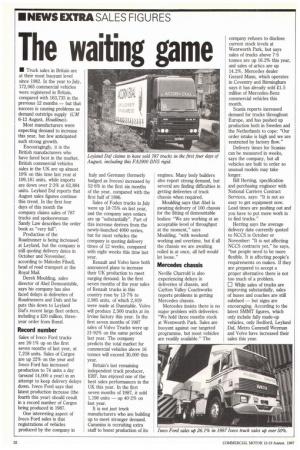The waiting
Page 24

If you've noticed an error in this article please click here to report it so we can fix it.
• Truck sales in Britain are at their most buoyant level since 1982. In the year to July, 172,065 commercial vehicles were registered in Britain, compared with 163,735 in the previous 12 months — but that success is causing problems as demand outstrips supply (CM 6-12 August, Headlines).
Most manufacturers were expecting demand to increase this year, but few anticipated such strong growth.
Encouragingly, it is the British manufacturers who have fared best in the market. British commercial vehicles sales in the UK are up almost 10% on this time last year at 109,181 units, while imports are down over 2.3% at 62,884 units. Leyland Daf reports that August sales figures continue this trend. In the first four days of this month the
company claims sales of 787 trucks and spokeswoman Sandy Law describes the order book as "very full".
Production of the Roadrunner is being increased at Leyland, but the company is still quoting delivery dates in October and November, according to Malcolm Filsell, head of road transport at the Royal Mail.
Derek Moulding, sales director of Abel Demountable, says his company has also faced delays in deliveries of Roadrunners and Dais and he puts this down to Leyland Dafs recent large fleet orders, including a £20 million, threeyear order from Btuizl.
Record number
Sales of Iveco Ford trucks are 26.1% up on the first seven months of last year, at 7,218 units. Sales of Cargos are up 22% on the year and Iveco Ford has increased production to 74 units a day (around 14,000 a year) in an attempt to keep delivery delays down. Iveco Ford says that latest production increase (the fourth this year) should result in a record number of Cargos being produced in 1987.
One interesting aspect of Iveco Ford sales is that registrations of vehicles produced by the company in Italy and Germany (formerly badged as Ivecos) increased by 52.6% in the first six months of the year, compared with the first half of 1986.
Sales of Foden trucks in July were up 18.75% on last year, and the company says orders are up "substantially". Part of this increase derives from the newly-launched 4000 series, but for most vehicles the company is quoting delivery times of 12 weeks, compared with eight weeks this time last year.
Renault and Volvo have both announced plans to increase their UK production to meet surging demand. In the first seven months of the year sales of Renault trucks in this country rose by 13.7% to 2,985 units, of which 2,819 were made at Dunstable. Volvo will produce 2,500 trucks at its Irvine factory this year. In the first seven months of 1987 sales of Volvo Trucks were up 21.92% on the same period last year. The company predicts the total market for commercial vehicles above 16 tonnes will exceed 30,000 this year.
Britain's last remaining independent truck producer, ERF, has enjoyed one of the best sales performances in the UK this year. In the first seven months of 1987, it sold 1,198 units — up 40.2% on last year.
It is not just truck manufacturers who are building up to meet stronger demand. Cummins is recruiting extra staff to boost production of its engines. Many body builders also report strong demand, but several are finding difficulties in getting deliveries of truck chassis when required.
Moulding says that Abel is awaiting delivery of 100 chassis for the fitting of demountable bodies: "We are working at an acceptable level of throughput at the moment," says Moulding, "with weekend working and overtime, but if all the chassis we are awaiting rolled in at once, all hell would let loose."
Mercedes chassis
Neville Charrold is also experiencing delays in deliveries of chassis, and Carlton Valley Coachworks reports problems in getting Mercedes chassis.
Mercedes insists there is no major problem with deliveries: "We hold three months stock at Wentworth Park. Sales are buoyant against our targeted programme, but most vehicles are readily available." The company refuses to disclose current stock levels at Wentworth Park, but says sales of trucks above 7-5 tonnes are up 16.2% this year, and sales of artics are up 14.2%. Mercedes dealer Gerard Mann, which operates in Coventry and Birmingham says it has already sold £1.5 million of Mercedes-Benz commercial vehicles this month.
Scania reports increased demand for trucks throughout Europe, and has pushed up production both in Sweden and the Netherlands to cope: "Our order intake is high and we are restricted by factory flow."
Delivery times for Scanias can be measured in weeks, says the company, but all vehicles are built to order so unusual models may take longer.
Bill Herring, specification and purchasing engineer with National Carriers Contract Services, says: "It is not so easy to get equipment now. Lead times are pushing out and you have to put more work in to find trucks."
Herring says the average delivery date currently quoted to NCCS is October or November: "It is not affecting NCCS contracts yet," he says, "but people need to be more flexible. It is affecting people's requirements on makes. If they are prepared to accept a proper alternative there is not too much of a problem.
ID While sales of trucks are improving substantially, sales of buses and coaches are still subdued — but signs are encouraging. According to the latest SWAT figures, which only include fully made-up vehicles, only Bedford, Leyland Daf, Metro Canunell Weyman and Volvo have increased their sales this year.












































































